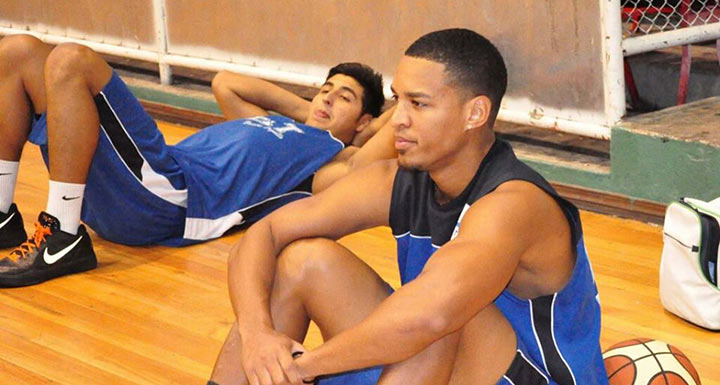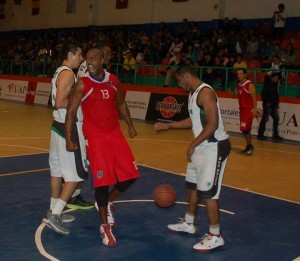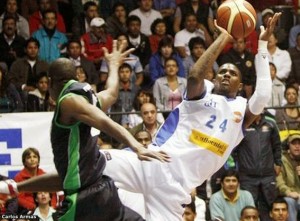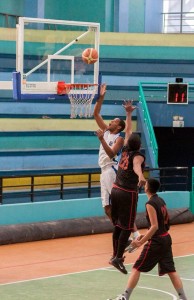
Self-employed basketball migrants
Cuban basketball today is very far from the spectacle that in the 1990s was a strong competitor to the National Baseball Series. It is also very far from that generation in the 1970s that stood on the Olympic podium at Munich.
This sport does not attract millions and its players are not signed up in outrageous contracts by the world’s best leagues. However, the departure of basketball players from Cuba is one of the most constant (and least talked about) emigrations.
Beginning in the 1990s, when emigration obstacles were raised for Cubans, many basketball players opted to abandon the teams that traveled to regional competitions, warm-up tours, friendly games, even the World Championship.
However, as a result of the transformations in the migratory sector, a radical change has occurred for the past two years in the way that Cuban basketball players join clubs in other countries. They no longer quit the delegations or refuse to return. Now, they buy their tickets legally and leave Cuba, to return after their overseas contracts have ended.
True, none of them have reached the top circles of that sport in world competition, but all have managed to play in Latin American and European leagues. There, far from the media attention of a country that lives baseball, they have earned their own space by dint of quality.
Migration, sports and delays
Many of these players found their opportunity in the new migration policy, which extended to 24 months the stay of Cubans overseas without loss of residence in their homeland.
Thus, with tranquility and total legal protection, they are released by the Cuban Basketball Federation (FCB) and defend the colors of teams that they never heard of before but pay handsomely.
Most of them were players well known on the island, members of teams that led in the national tournament, but they grew tired of waiting for a change that had been promised but failed to materialize.
With the legal possibility of being hired by foreign clubs — announced in September 2013 and presumably in effect since January 2014 — many expected the end of a wait that had frustrated several generations.
But the reality was different. Other than four contracts made with Japanese baseball teams, no other sport — team or individual — has benefited by the change.
According to Ruperto Herrera, president of the FCB, only two solid offers have been made so far for Cuban basketball players to play in the Argentine league, “one for Javier Justiz and the other for Jasiel Rivero, two young men with great outlooks. But we haven’t begun the negotiations because our federation has not received the green light to do so,” Herrera says.
The same situation exists in other sports, such as volleyball, whose federation still has not received “authorization” to begin the necessary negotiations, even though the talent of its players will soon be sought by several clubs worldwide.
That delay casts doubt on a real willingness to implement a policy of remuneration, announced almost a year ago by the Cuban government and INDER, the national sports institute. In addition, it compels some players to try their luck abroad by themselves, rather than wait for tardy mediators.
During the recent warm-up tour through China and Mexico, some players in the Cuban basketball team observed the interest in them shown by Latin American and Asian teams.
“One Brazilian representative showed interest, but there was nothing the [Cuban basketball] federation could do,” one of the players said. “The offers were made. What are we waiting for?”
On their own
 Juan Luis Álvarez was a fine player in Cuba. With the Capitalinos team, he won the Superior Basketball League (LSB) championship in 2011, relying on his height and accurate shooting from outside the area. Today, he plays in the club league in Peru, where he has shone brightly. He’s not the only one.
Juan Luis Álvarez was a fine player in Cuba. With the Capitalinos team, he won the Superior Basketball League (LSB) championship in 2011, relying on his height and accurate shooting from outside the area. Today, he plays in the club league in Peru, where he has shone brightly. He’s not the only one.
Reinier Panfet will always be remembered in Cuba for his ability to create spectacular plays that he served on silver platters to his Havana teammates for more than a decade. He also plays in Peru.
Another Havana player who looked for new horizons was Santiago Peñalver. A regular organizer for his team during the last season of the LSB, Peñalver is now in the ADN Cosmos of the Ecuadorean Basketball League (LEB).
Michael Guerra, the only man to win the LSB tournament as a player (Centrales and Ciego de Ávila) and coach (Ciego de Ávila), also tried his luck in Ecuador but with different results.
However, others with more modest records have joined the LEB without difficulty: Marvin Cairo, Yaser Ferrer, Darol Hernández, Daniel Nembhard and Reynaldo García are in the legion of players that have made the Ecuadorean league their new home.
All did the same: they asked for release from the Cuban league and — armed with a passport and sometimes a contract — went to play basketball, legally, to wherever they could find a space.
 Panfet and Álvarez were among the first to do so. They began their journey in the Uruguayan tournament and then went to Peru, on the tracks of Sergio “The Tiger” Ferrer, a legend in Cuban basketball, who until last year played in Juventus, a Lima team.
Panfet and Álvarez were among the first to do so. They began their journey in the Uruguayan tournament and then went to Peru, on the tracks of Sergio “The Tiger” Ferrer, a legend in Cuban basketball, who until last year played in Juventus, a Lima team.
Panfet says that many of those leagues are not as strong as the Cuban LSB and that many of our players could gain experience in them while earning some money.
Álvarez and Panfet are examples of that. During their first season in Peru, they were recruited by the César Vallejo University team (UCV), which won no games in first division but declared the Cubans their most valuable players in the classification rounds.
The salaries in these tournaments are not huge and are consistent with the team’s budget and the quality of the players. Reynaldo García has spent seven years in that situation. His initial salary was 500 dollars a month; today, it is 5,000 dollars.
Last year, he was in Mexico and this year will go to Argentina — a real globetrotter.
Herrera, president of the Cuban federation, says that the players are no longer part of his working group because they asked for their release.
With regard to possible hirings, the National Basketball Commission has said it will not suspend the competitive schedule of the LSB, adding that the Cuban players can rejoin their teams after the season, once they have served their commitments elsewhere.
For the moment, all that talk is hypothetic because no accord has been formalized with the FCB as a legal representative of the Cuban players. The situation becomes more complex because the FCB depends on the INDER’s legal and economic departments, which are in charge of evaluating the proposals and making sure that the contracts are “favorable” for the Cuban players.
While these slow movements take place in the organization that rules basketball in Cuba, reality hastens forward. The players have found a more expeditious way to find — by themselves — employers willing to pay for their quality while avoiding time-consuming negotiations.
Now it is the players themselves who — armed with passports and talent — leave their homeland and become self-employed basketball entrepreneurs.

